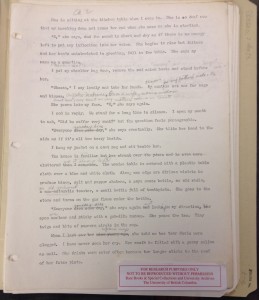Recently in ASTU, the class read local author Joy Kogawa’s novel Obasan, an account of a family of Japanese-Canadians during the Second World War and the Japanese internment. After reading, we were fortunate enough to explore Joy Kogawa’s fonds in the UBC Rare Books and Special Collections. In her fond, Kogawa kept everything that had to do with her works, including rough drafts, letters to publishers, editors notes, rejection letters, and many letters from readers, including very entertaining child readers and even one from Pierre Trudeau!
One of the most interesting things that I found in Kogawa’s fond was seeing the evolution of the story told through her many rough drafts. As a reader I often find myself pouring over words and phrases in books that seem so effortless, but at the same time so impactful. However, while reading Kogawa’s many drafts, I realized that authors pour over these phrases and words just as much as we do to find the perfect way to portray their work, and the process of coming to these words, is anything but effortless.
One specific instance where I noticed this was in Kogawa’s second draft of chapter three with Obasan’s repeated line as we know it now, “Everyone someday dies” (11). I saw in Kogawa’s drafts that she contemplated several different ways to write this one line, and eventually settled with the way it is represented in the novel.



We can see in these examples, that she felt that this line in the story was so important, that even the slightest of word changes were necessary to make a difference. As readers, we always try to pick out parts of the books that we believe have the most meaning and the most value. Sometimes, however, it is hard to tell if these words we have been pouring over like codes to crack are really as important to the author as we believe them to be. Having access to these fonds gives us as readers a lot of insight into the mind of the author, what her thought processes were, and what parts she believed to be important.
Overall, I felt very fortunate to be able to witness these artefacts that were saved by such a talented author as Joy Kogawa. I felt as though I was a detective, sifting my way through documents and letters in order to truly understand Joy Kogawa, her reasons and motivation for writing, and the way hundreds of other readers have been impacted by her writing.
Works Cited:
Kogawa, Joy. Manuscript draft of Obasan. n.d. ms. Box 8 File 4. Joy Kogawa fonds. University of British Columbia Library Rare Books and Special Collections, Vancouver, Canada.
Kogawa, Joy. Obasan. Ontario: Penguin Books, 1983. Print.